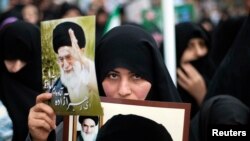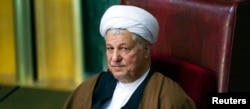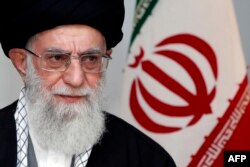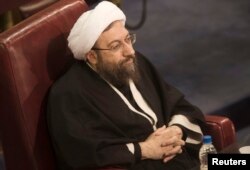The issue of succession to the supreme leadership is generally a taboo subject in Iran. It probably would not have been discussed at all in recent weeks if the current supreme leader, Ayatollah Ali Khamenei, hadn't alluded to his inevitable demise in a speech last September.
Now that voters have selected a new Assembly of Experts, the topic is very much on minds both inside and outside of Iran. Comprising 88 clerics tasked with naming, monitoring and possibly even dismissing Supreme Leaders, the new assembly may be called on to name Iran’s next leader.
Election results issued Monday stunned Iran’s ruling elite: The first 30 seats went to reformists and moderates. Former president Hashemi Rafsanjani won the top seat, and President Hassan Rouhani the third highest.
Adding insult to injury for the establishment, two prominent conservative clerics lost their seats altogether, and the current head of the Guardian Council, the man who barred thousands of mainly reformist candidates from running in last week’s elections, made it onto the assembly by the skin of his teeth only, finishing last place among Tehran’s 16 representatives.
“I think that once you put these factors together, it sort of communicates to the Supreme Leader where the public stands on a lot of these issues,” said Mehrzad Boroujerdi, Chair and Professor of Political Science at Syracuse University’s Maxwell School of Citizenship and Public Affairs. “So I would say the significance of it really is as a wakeup call at this point -- but not necessarily something radical in terms of how the next leader will be selected.”
Iranian king-making
Deciding the most powerful man in Iran is still a somewhat untested process. Khamenei assumed office in 1989 on the recommendation of his predecessor, the founder of the Islamic Republic, the Ayatollah Ruhollah Khomeini.
Iran’s constitution tasks the assembly with selecting a new leader who is grounded in Islamic theology and jurisprudence, politics and social issues and possesses “prudence, courage, administrative facilities and adequate capability for leadership.”
In case of a tie, the assembly should select the man with more legal and political expertise.
It’s not a decision the assembly is likely to make in a vacuum; Khamenei could handpick his own successor.
“And because so many of the sitting members of the assembly are his ‘boys,’ his personal representatives, we might say it’s a fait accompli,” Boroujerdi said.
Other influential groups could have a say in matters, said lawyer, political analyst and commentator Saam Borhani. “One is the Revolutionary Guard. The other is business interests, which we don’t really hear about that much.”
Iran's traditional business class represents a power base itself that is mostly friendly to the technocrats and moderate conservatives aligned with Rafsanjani and Rouhani, he explained.
“These groups, along with the reformists, have loudly complained about military overreach in the economy and they are an important factor in Iranian politics," he said.
Analysts agree it isn’t likely a reformist will be named as supreme leader any time in the near future, as they have been banished from the system.
But that doesn’t mean they don’t still have influence.
Potential contenders
Originally, only the top-ranking religious clerics were eligible for supreme leadership, but in 1989, Khomeini appointed a review council who amended the constitution to accommodate his choice for successor, Khamenei. While many clerics meet the position’s qualifications, a few names stand out:
Grand Ayatollah Mahmoud Hashemi Shahroudi, the former head of the judiciary, Iraqi born, considered to be a moderate conservative that could appeal to both the left and right in Iran. However, because he was born in Iraq, analysts say he may not be eligible to lead.
"If I were a betting man, the current head of the judiciary, Ayatollah Sadegh Larijani, is a good candidate,” said Syracuse University’s Boroujerdi, “in the sense that he is young, 56 years of age and smart. He has been very, very loyal to the Supreme Leader, functioning as his ‘pack dog’ in many ways.”
Larjani is a member of a politically-prominent family; his brother is speaker of the parliament, and he is married to the daughter of a heavyweight Grand Ayatollah.
There has been talk that either reformist Hassan Khomeini, the founder’s grandson who was disqualified from running in last week’s vote, or Khamenei’s own son Mojtaba could qualify for the job.
“But I wouldn’t put too much stock into him,” said Borhani.
After all, he added, the whole point of the Islamic revolution was to oust a dynasty.







